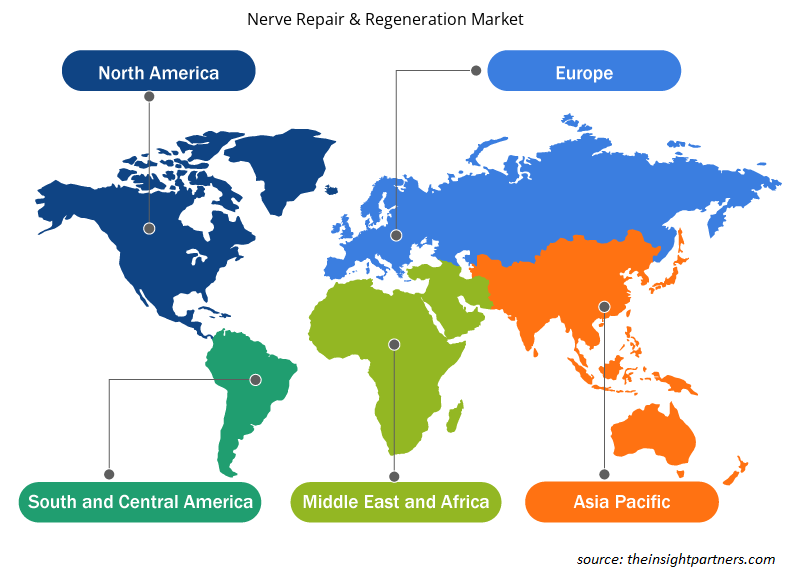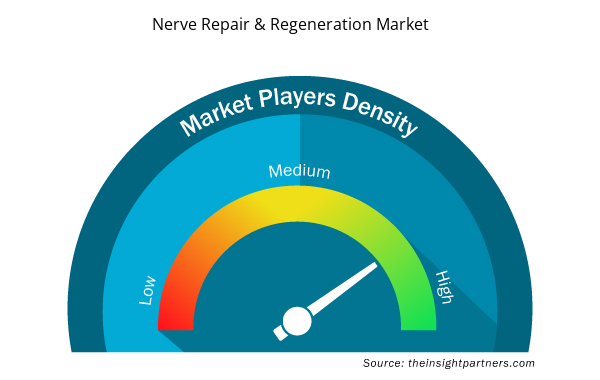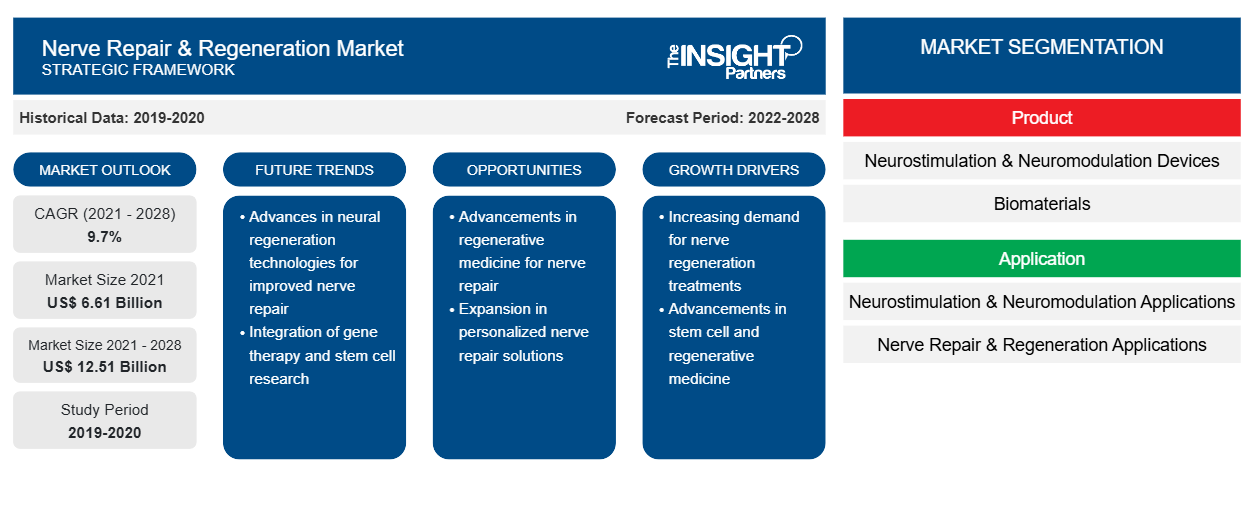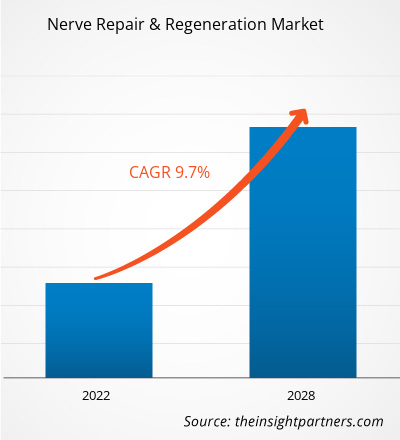神经修复和再生市场预计将从 2021 年的 66.0771 亿美元增至 2028 年的 125.1406 亿美元;预计 2022 年至 2028 年的复合年增长率为 9.7%。
神经与大脑和脊髓一起构成了神经系统的基础。神经修复是一种涉及探查受伤神经并去除神经末梢受伤组织或疤痕的方法。同时,神经再生是指神经组织、细胞或产物的再生或修复。再生机制可能包括产生新的神经元、神经胶质细胞、轴突、髓鞘或突触。神经修复和再生由各种产品进行,包括神经刺激和神经调节装置以及生物材料,例如神经导管、神经包裹物、神经连接器和其他生物材料。
神经修复和再生市场根据产品、应用和地域进行细分。按地域划分,神经修复和再生市场大致分为北美、欧洲、亚太地区、中东和非洲以及南美和中美洲。该报告提供了对市场的见解和深入分析,强调了市场趋势、技术进步、市场动态和世界主要市场参与者的竞争格局等参数。
定制此报告以满足您的需求
您可以免费定制任何报告,包括本报告的部分内容、国家级分析、Excel 数据包,以及为初创企业和大学提供优惠和折扣
- 获取此报告的关键市场趋势。这个免费样品将包括数据分析,从市场趋势到估计和预测。
市场洞察
神经损伤发病率不断上升推动神经修复和再生市场增长
神经损伤很普遍,可能会对患者造成严重影响。大多数神经损伤是由慢性累积性创伤或急性损伤造成的。根据美国国家生物技术信息中心的数据,创伤性脑损伤 (TBI) 可能由各种创伤引起,从简单的头部撞击到脑部穿透性损伤。此外,根据同一来源,在美国,约有 170 万人遭受创伤性脑损伤,其中 15 至 19 岁的青少年和 65 岁及以上的成年人在 2019 年更有可能遭受创伤性脑损伤。
帕金森病、痴呆、癫痫和癫痫发作、自闭症、脑瘤、脑瘫、阿尔茨海默病等神经系统疾病会影响人体的大脑和神经。在美国,神经系统疾病的患病率正在上升。根据美国疾病控制和预防中心 (CDC) 的数据,阿尔茨海默病是美国十大死亡原因之一。2020 年,阿尔茨海默病影响了美国 580 万人。同样,根据帕金森基金会患病率项目的数据,估计到 2020 年,美国将有 93 万帕金森病患者。
目前,痴呆症是所有疾病中第七大致死原因,也是全球老年人残疾和成瘾的主要原因之一。据世界卫生组织称,全球有超过 5500 万人患有痴呆症,每年新增近 1000 万例。痴呆症是由各种疾病和损伤引起的,这些疾病和损伤主要或次要影响大脑。阿尔茨海默氏症是最常见的痴呆症,可能导致 60-70% 的病例。因此,神经损伤发病率的不断上升和神经系统疾病的高患病率预计将在预测期内推动神经修复和再生市场的发展。
老年人口增长对市场增长贡献巨大
一些神经系统疾病,如神经病、阿尔茨海默病、帕金森病和中风在老年人中更为常见,而且随着预期寿命的延长,这些疾病的患病率也会增加。据世界卫生组织称,全球人口正在迅速老龄化。2015 年至 2050 年间,全球 60 岁以上人口将几乎翻一番,从 12% 增至 22%,老年人的精神和神经系统疾病可能占该年龄组总伤残调整生命年 (DALY) 的 6.6%。此外,根据同一来源,约 15% 的 60 岁及以上成年人患有精神疾病。
根据美国疾病控制与预防中心 (CDC) 的数据,阿尔茨海默病是 65 岁及以上人群的第五大死亡原因。此外,患有阿尔茨海默病的人数每五年就会翻一番。此外,2020 年,阿尔茨海默病影响了约 580 万 65 岁及以上的美国人,到 2060 年,这一数字预计将增长近三倍,达到美国 1400 万人。
因神经系统疾病导致的死亡率也在上升。例如,根据阿尔茨海默病协会的数据,三分之一的老年人死于阿尔茨海默病或痴呆症。
因此,与年龄相关的神经系统疾病患病率的上升增加了对神经修复和再生治疗的需求。这一因素推动了神经修复和再生市场的增长。
产品洞察
根据产品,全球神经修复和再生市场细分为神经刺激和神经调节设备以及生物材料。2021 年,神经刺激和神经调节设备细分市场占据了最大的市场份额。然而,生物材料细分市场的市场预计将在 2022-2028 年期间以最高的复合年增长率增长。用于再生中枢神经系统 (CNS) 和周围神经系统 (PNS) 的生物材料已经得到了很好的开发。这些材料被广泛用作 PNS 修复中的神经修复膜和神经导管。生物材料促进组织修复并充当细胞和药物治疗载体。根据美国国家医学图书馆 2020 年的数据,约 87% 的 PNS 是由创伤病例引起的。根据伯明翰大学的数据,全球每年报告的脊髓损伤新病例约为 130,000 例。所有这些因素预计都将推动生物材料细分市场的发展。生物材料分为神经导管、神经包裹、神经连接器和其他生物材料。
应用程序洞察
根据应用,神经修复和再生市场细分为神经刺激和神经调节应用以及神经修复和再生应用。神经修复和再生细分市场细分为直接神经修复/神经缝合、神经移植和干细胞治疗。神经修复和再生细分市场在 2021 年占据了最大的市场份额。然而,由于神经技术的快速发展和各种神经系统疾病的新兴有前景的治疗方法,预计到 2028 年,神经刺激和神经调节应用将成为市场的最大股东。
产品发布和并购是全球神经修复和再生市场参与者广泛采用的策略。以下列出了一些近期的关键产品开发:
- 2022 年 2 月,史赛克宣布已完成对数字护理协调和通信领导者 Vocera Communications, Inc. 的收购。Vocera 为史赛克的医疗部门带来了高度互补和创新的产品组合,这将增强公司的高级数字医疗产品,并进一步推进史赛克在整个护理过程中预防不良事件的重点。
- 2020 年 1 月,美敦力公司宣布收购总部位于伊利诺伊州布卢明顿的私营公司 Stimgenics, LLC,该公司率先推出了一种新型脊髓刺激 (SCS) 波形,即差异靶向多路复用 (DTM) 脊髓刺激。该疗法通过美敦力 Intellis 平台提供,是一种治疗慢性疼痛患者的全新独特编程选项。
神经修复和再生
神经修复与再生市场区域洞察
Insight Partners 的分析师已详尽解释了预测期内影响神经修复和再生市场的区域趋势和因素。本节还讨论了神经修复和再生市场的各个部分和地理区域,包括北美、欧洲、亚太地区、中东和非洲以及南美和中美洲。

- 获取神经修复和再生市场的区域特定数据
神经修复与再生市场报告范围
| 报告属性 | 细节 |
|---|---|
| 2021 年市场规模 | 66.1亿美元 |
| 2028 年市场规模 | 125.1亿美元 |
| 全球复合年增长率(2021 - 2028) | 9.7% |
| 史料 | 2019-2020 |
| 预测期 | 2022-2028 |
| 涵盖的领域 | 按产品
|
| 覆盖地区和国家 | 北美
|
| 市场领导者和主要公司简介 |
|
神经修复和再生市场参与者密度:了解其对业务动态的影响
神经修复和再生市场正在快速增长,这得益于终端用户需求的不断增长,而这些需求又源于消费者偏好的不断变化、技术进步以及对产品优势的认识不断提高等因素。随着需求的增加,企业正在扩大其产品范围,进行创新以满足消费者的需求,并利用新兴趋势,从而进一步推动市场增长。
市场参与者密度是指在特定市场或行业内运营的企业或公司的分布情况。它表明在给定市场空间中,相对于其规模或总市场价值,有多少竞争对手(市场参与者)存在。
在神经修复和再生市场运营的主要公司有:
- Axogen 公司
- 波士顿科学公司
- Integra 生命科学
- 美敦力
- 雅培实验室
免责声明:上面列出的公司没有按照任何特定顺序排列。

- 了解神经修复和再生市场顶级关键参与者概况
COVID-19 疫情对神经修复和再生市场的影响好坏参半。2020 年第一季度,封锁限制限制了神经损伤病例,因此对神经修复手术的生物材料的需求有所减少。车祸是导致周围神经损伤的最常见原因,但在封锁期间,由于行动受限,神经损伤较少。然而,美国卫生与公众服务部报告称,2020 年,解除封锁后,美国因事故或意外伤害死亡的人数增加了近 17%。报告还称,事故是 2020 年第四大死亡原因,死亡人数仅比 COVID-19 死亡人数少 15 万。这些死亡是由于 COVID-19 安全协议导致意外病例的手术程序延迟而导致的。此外,2020年第一季度后,由于神经损伤治疗和手术的增多,市场呈现平均增长速度。
根据地域分布,全球神经修复与再生市场主要分为北美、欧洲、亚太地区、中东和非洲 (MEA) 以及南美洲和中美洲。北美市场进一步细分为美国、加拿大和墨西哥。欧洲市场细分为法国、德国、英国、西班牙、意大利和欧洲其他地区。亚太地区市场细分为日本、中国、印度、澳大利亚、韩国和亚太地区其他地区。MEA 的神经修复与再生市场进一步细分为沙特阿拉伯、阿联酋、南非和 MEA 其他地区。南美洲和中美洲市场细分为巴西、阿根廷和南美洲和中美洲其他地区。
全球神经修复和再生市场中的公司很少,包括 Axogen Corporation、Boston Scientific Corporation、Integra LifeSciences、Medtronic、Abbott Laboratories、Stryker Corporation、Neuronetics、LivaNova PLC、Baxter 和 Polyganics BV。
- 历史分析(2 年)、基准年、预测(7 年)及复合年增长率
- PEST 和 SWOT 分析
- 市场规模价值/数量 - 全球、区域、国家
- 行业和竞争格局
- Excel 数据集



Report Coverage
Revenue forecast, Company Analysis, Industry landscape, Growth factors, and Trends

Segment Covered
This text is related
to segments covered.

Regional Scope
North America, Europe, Asia Pacific, Middle East & Africa, South & Central America

Country Scope
This text is related
to country scope.
常见问题
The global nerve repair & regeneration market on region, is segmented into North America, Europe, Asia Pacific, Middle East & Africa, and the South & Central America. In 2021, North America held the largest market share. However, Asia Pacific region is estimated to grow at the fastest CAGR of 10.2% during the forecast period.
The global nerve repair & regeneration market based on product, is segmented into neurostimulation and neuromodulation devices and biomaterials. In 2021, the neurostimulation & neuromodulation devices segment held the largest share of the market and the market for the biomaterials segment is expected to grow at the highest CAGR of 9.8% during 2022–2028.
The nerve repair & regeneration market majorly consists of the players such as Axogen Corporation, Boston Scientific Corporation, Integra LifeSciences, Medtronic, Abbott Laboratories, Stryker Corporation, Neuronetics, LivaNova PLC, Baxter, and Polyganics BV.
The dearth of trained professionals is expected to restrict the market growth during the forecast period.
Factors such as growing incidence of nerve injuries and high prevalence of neurological disorders, growing geriatric population and rising prevalence of age-associated neurological disorders, and increasing funding by private and government organizations for research in neurology.
Nerves along with the brain and spinal cord, are the foundation of nervous system. Nerve repair is method which involves exploration of the injured nerve and removal of injured tissue or scar from the nerve endings. While nerve regeneration refers to the regrowth or repair of nervous tissues, cells or cell products. Regeneration mechanism may include generation of new neurons, glia, axons, myelin, or synapses. The nerve repair & regeneration is carried out by various products which includes neurostimulation & neuromodulation devices and biomaterials such as nerve conduits, nerve wraps, nerve connectors, and other biomaterials.
Trends and growth analysis reports related to Life Sciences : READ MORE..
The List of Companies - Nerve Repair & Regeneration Market
- Axogen Corporation
- Boston Scientific Corporation
- Integra LifeSciences
- Medtronic
- Abbott Laboratories
- Stryker Corporation
- Neuronetics
- LivaNova PLC
- Baxter
- Polyganics BV
The Insight Partners performs research in 4 major stages: Data Collection & Secondary Research, Primary Research, Data Analysis and Data Triangulation & Final Review.
- Data Collection and Secondary Research:
As a market research and consulting firm operating from a decade, we have published and advised several client across the globe. First step for any study will start with an assessment of currently available data and insights from existing reports. Further, historical and current market information is collected from Investor Presentations, Annual Reports, SEC Filings, etc., and other information related to company’s performance and market positioning are gathered from Paid Databases (Factiva, Hoovers, and Reuters) and various other publications available in public domain.
Several associations trade associates, technical forums, institutes, societies and organization are accessed to gain technical as well as market related insights through their publications such as research papers, blogs and press releases related to the studies are referred to get cues about the market. Further, white papers, journals, magazines, and other news articles published in last 3 years are scrutinized and analyzed to understand the current market trends.
- Primary Research:
The primarily interview analysis comprise of data obtained from industry participants interview and answers to survey questions gathered by in-house primary team.
For primary research, interviews are conducted with industry experts/CEOs/Marketing Managers/VPs/Subject Matter Experts from both demand and supply side to get a 360-degree view of the market. The primary team conducts several interviews based on the complexity of the markets to understand the various market trends and dynamics which makes research more credible and precise.
A typical research interview fulfils the following functions:
- Provides first-hand information on the market size, market trends, growth trends, competitive landscape, and outlook
- Validates and strengthens in-house secondary research findings
- Develops the analysis team’s expertise and market understanding
Primary research involves email interactions and telephone interviews for each market, category, segment, and sub-segment across geographies. The participants who typically take part in such a process include, but are not limited to:
- Industry participants: VPs, business development managers, market intelligence managers and national sales managers
- Outside experts: Valuation experts, research analysts and key opinion leaders specializing in the electronics and semiconductor industry.
Below is the breakup of our primary respondents by company, designation, and region:

Once we receive the confirmation from primary research sources or primary respondents, we finalize the base year market estimation and forecast the data as per the macroeconomic and microeconomic factors assessed during data collection.
- Data Analysis:
Once data is validated through both secondary as well as primary respondents, we finalize the market estimations by hypothesis formulation and factor analysis at regional and country level.
- Macro-Economic Factor Analysis:
We analyse macroeconomic indicators such the gross domestic product (GDP), increase in the demand for goods and services across industries, technological advancement, regional economic growth, governmental policies, the influence of COVID-19, PEST analysis, and other aspects. This analysis aids in setting benchmarks for various nations/regions and approximating market splits. Additionally, the general trend of the aforementioned components aid in determining the market's development possibilities.
- Country Level Data:
Various factors that are especially aligned to the country are taken into account to determine the market size for a certain area and country, including the presence of vendors, such as headquarters and offices, the country's GDP, demand patterns, and industry growth. To comprehend the market dynamics for the nation, a number of growth variables, inhibitors, application areas, and current market trends are researched. The aforementioned elements aid in determining the country's overall market's growth potential.
- Company Profile:
The “Table of Contents” is formulated by listing and analyzing more than 25 - 30 companies operating in the market ecosystem across geographies. However, we profile only 10 companies as a standard practice in our syndicate reports. These 10 companies comprise leading, emerging, and regional players. Nonetheless, our analysis is not restricted to the 10 listed companies, we also analyze other companies present in the market to develop a holistic view and understand the prevailing trends. The “Company Profiles” section in the report covers key facts, business description, products & services, financial information, SWOT analysis, and key developments. The financial information presented is extracted from the annual reports and official documents of the publicly listed companies. Upon collecting the information for the sections of respective companies, we verify them via various primary sources and then compile the data in respective company profiles. The company level information helps us in deriving the base number as well as in forecasting the market size.
- Developing Base Number:
Aggregation of sales statistics (2020-2022) and macro-economic factor, and other secondary and primary research insights are utilized to arrive at base number and related market shares for 2022. The data gaps are identified in this step and relevant market data is analyzed, collected from paid primary interviews or databases. On finalizing the base year market size, forecasts are developed on the basis of macro-economic, industry and market growth factors and company level analysis.
- Data Triangulation and Final Review:
The market findings and base year market size calculations are validated from supply as well as demand side. Demand side validations are based on macro-economic factor analysis and benchmarks for respective regions and countries. In case of supply side validations, revenues of major companies are estimated (in case not available) based on industry benchmark, approximate number of employees, product portfolio, and primary interviews revenues are gathered. Further revenue from target product/service segment is assessed to avoid overshooting of market statistics. In case of heavy deviations between supply and demand side values, all thes steps are repeated to achieve synchronization.
We follow an iterative model, wherein we share our research findings with Subject Matter Experts (SME’s) and Key Opinion Leaders (KOLs) until consensus view of the market is not formulated – this model negates any drastic deviation in the opinions of experts. Only validated and universally acceptable research findings are quoted in our reports.
We have important check points that we use to validate our research findings – which we call – data triangulation, where we validate the information, we generate from secondary sources with primary interviews and then we re-validate with our internal data bases and Subject matter experts. This comprehensive model enables us to deliver high quality, reliable data in shortest possible time.


 获取此报告的免费样本
获取此报告的免费样本